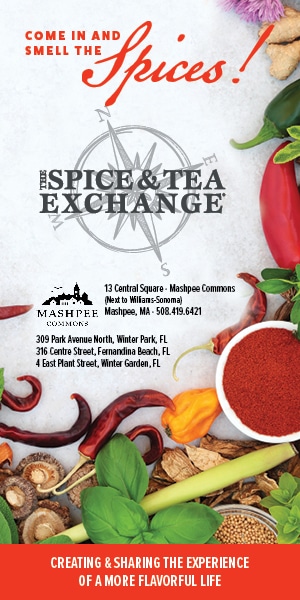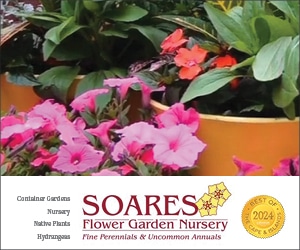
Creating Buzz…
Cape Cod Garden / GARDEN ANNUAL 2022 / Nature
Writer: Julie Craven Wagner
Creating Buzz…

Cape Cod Garden / GARDEN ANNUAL 2022 / Nature
Writer: Julie Craven Wagner
Pollinators are more than a natural addition to a summer garden, they are critical to the food production for every living creature on earth.
In 2019, during the summer, as our days were filled with carefree actions, and bees and butterflies provided a backdrop of bucolic bliss, filmmaker Peter Nelson was screening his latest film, The Pollinators, to an audience at the Woods Hole Film Festival.

The film captivates with its stunning photography—much of it in slow-motion—as it tells the tale of the current plight of bees, beekeepers, farmers, growers, chefs and really the entire world population. Bees and other pollinators are critically responsible for pollinating every crop on the planet; without the pollinators, literally, we would have no food.
Recently bee losses from 40 to 60 percent annually, due to a wide variety of factors, have impacted beekeepers who crisscross the nation to pollinate crops as different plant species evolve through their blossom and fruit phases. The movie chronicles commercial beekeepers as they travel across the country at night, when the bees are more settled, in loaded semi-tractor trailers to almond crops in Northern California, apples in the northwest, blueberries in Maine, cranberries in Wisconsin and pumpkins throughout the land.
As Nelson profiles farmers, growers, beekeepers, chefs and other professionals who rely on the work the honeybees accomplish, it becomes clear that many current and popular practices throughout America are counter-productive to a strong bee population, and ultimately a vital and robust agricultural production.
“For a year and a half, I traveled to 14 states over the seasons of pollination, filming more than 85 days to tell this extraordinary story of honey bees, migratory beekeepers and their importance to our food and agriculture system,” Nelson explains.


A beekeeper himself, Nelson shares, “When I started beekeeping myself, nearly 30 years ago, I had no idea that ultimately it would lead me to making a film about migratory beekeepers, bees and our food system. Yet the intersection of these elements was a story I felt had not been fully explored and one that needed to be told. My decades of experience as a backyard beekeeper has given me a solid understanding of honey bees and also a certain credibility with the commercial beekeepers. That, along with my decades as a cinematographer and storyteller, has made this a perfect film for me to make.”
He continues, “There is something about honey bees that touches people: their beauty, their indefatigable work ethic, their efficiency—and especially their honey!—make them a charismatic insect, with fascinating and complex societies that are a window into the natural world that we all long for. But while most people have heard that bees are in trouble and are interested in knowing more about what the problem is, few realize how their decline threatens our food system.”
The Pollinators is available as a licensed opportunity for non-profit and other organizations to host fund raising events. For more information, visit thepollinators.net.
In The Clover
Joan Spiegel, along with her partner Russell Giammarco, have been beekeepers for the better part of ten years. They sell their Lewis Bay Honey collected from their more than 20,000 bees at local farmers’ markets and roadside stands around the town of Barnstable. In 2016, the couple purchased a historic farm in Marstons Mills with over 10 acres of agricultural space. “Our main focus are our bees,” says Spiegel, whose pastoral setting is home to their hives—as well as Guinea Hens, turkeys, Frizzle Chickens and soon, alpacas.
For the past six years Spiegel and Giammarco have thoughtfully restored the property and the grounds with a clear vision that drives each decision. “Our goal is to create optimal forage for the bees,” Spiegel explains. Forage, the plant material visited by bees and other pollinators in their own attempt to gather pollen, comes in many varieties and varying degrees of appeal for the various pollinators. Trees, flowers, shrubs and bushes—they are all forage.



At Homestead Farm, the plans for 2022 include planting a hillside with an acre and a half of Melilotus clover, a high sweet clover which is literally nectar to honey bees. Spiegel also harvests a quarter of an acre of lavender. Most people might be surprised to learn that lavender, with its heady scent, does not attract honey bees, but rather bumble bees, not a species, Spiegel and Giammarco support in their hives. “We love the lavender,” says Spiegel, who confirms that statement with the multitude of bundles and sachets she gifts to friends and family that visit the farm. “But, it doesn’t serve the honey bees. The monarchs sometimes go for it, but for them we planted a lot of milkweed.”
As Spiegel mentions, the pollinators supported and encouraged at Homestead Farm include monarch butterflies as well as honey bees. She and Giammarco raised the monarchs from larvae to fully formed adult butterflies, which help to pollinate the many species of flowers, shrubs, and trees that are found throughout the farm’s landscape.
Down a Primrose Path to the House of Wings

The Cape Cod Museum of Natural History in Brewster has recently expanded their outdoor exhibit offerings with a Pollinator Path and a Butterfly House. Tyan Bassett, Animal Care Coordinator at the beloved museum says the Pollinator Path, a short loop that precedes entrance into the Butterfly House, has been a popular addition to the hands-on experiences the museum has become known for. “Everyone loves this exhibit,” Bassett explains. “The kids love to get down and really explore among the plants and the insects. And the adults take great attention to the plant markers that tell them the varietial names so they know what to plant for their own garden. In other words, they can see it all happening in front of them.”
The garden’s layout and plant material were provided by Brewster’s Crocker Nurseries who is a loyal sponsor of the museum’s programs, and provides visitors with a local resource when they decide to plant for pollinators in their own garden.
The Butterfly House, which is staffed during museum hours by two volunteers, is a tropic-like expression of flora and fauna, as the various forage plants which have been carefully and deliberately selected to provide all of the nectar and nutrients that many species of butterflies and moths are in search of during the hot summer months. The house is home to up to 11 species of butterflies, including the very rare and elusive Zebra Swallowtail, which the museum orders every three weeks as the current flock reaches the end of its lifespan. Over the course of a season, thousands of butterflies are released in the house, forage, flit, flutter and give everything they have during their short life to pollinate the natural world.

Species that may be encountered at the Butterfly House
Julie Craven Wagner is the editor of Cape Cod GARDEN.












